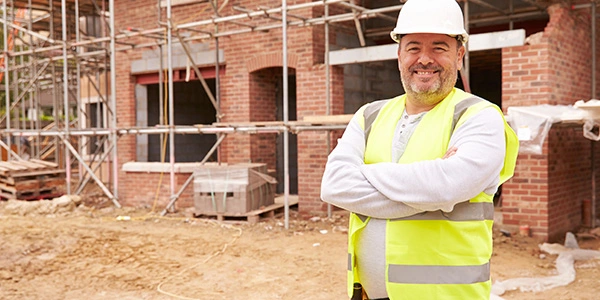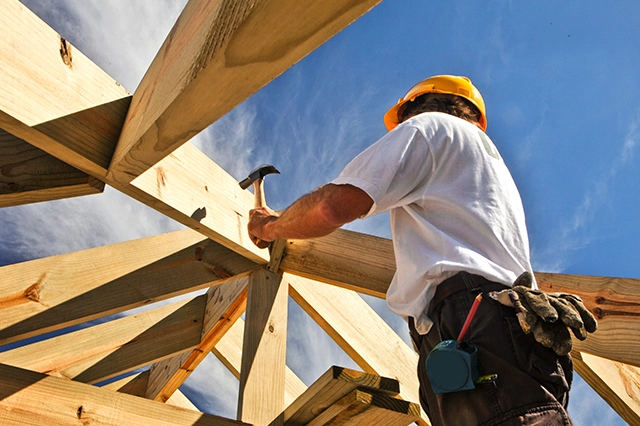What is Builders Insurance?
Builders insurance, commonly referred to as construction insurance or contractors insurance, is a type of cover that protects builders and related professionals from the risks they encounter in their line of work through a comprehensive builders insurance policy.
There are several aspects to this type of insurance, each tailored to the specific risks faced by builders and contractors. Whether you build standalone houses or home improvements, you’ll need insurance for builders to ensure you are protected.
How our process works
We’ve worked hard to refine our process and keep it as quick, easy and simple as possible for our customers.
What Does Builders Insurance Cover?
Builders insurance is a comprehensive safety net designed to protect builders and construction businesses from a variety of risks and liabilities.
Who Needs Builders Insurance
Builders insurance is designed for professionals in the construction and building industry. Builders liability insurance is essential for professionals in the construction and building industry, providing comprehensive coverage tailored to the unique risks faced by various trades. While the name suggests it’s primarily for builders, the cover can be relevant to a range of professionals involved in construction projects. Here are the primary categories of individuals and businesses that might need builders insurance:
General Builders: Whether you’re a sole trader or run a larger, limited construction company, builders insurance can cover you against the most common risks faced during construction.
Specialist Contractors: This includes professionals such as electricians, plumbers, carpenters, plasterers, bricklayers, roofers, and many others. Each of these trades has its unique risks, and a tailored insurance policy can provide the necessary protection.
Property Developers: If you are involved in the business of renovating or building properties for sale or rent, you would need builders insurance to cover potential damages or risks during the construction phase.
Design-and-Build Contractors: Those who not only construct but also provide design or architectural services may need specific coverages like professional indemnity insurance in addition to typical builders’ coverages.
Groundworkers: These professionals lay foundations, install drainage systems, and perform other tasks that require working on and below the ground. Their work can pose unique risks, making builders insurance essential.
Civil Engineers: Professionals involved in designing and supervising infrastructure projects like bridges, roads, and dams can benefit from builders insurance, especially the professional indemnity aspect of it.
Self-build Homeowners: If you’re an individual looking to build your home (or oversee the construction), you might need builders insurance to cover risks associated with the construction phase. This is especially true if you’re acting as the main contractor.
Demolition Contractors: Given the inherent risks in the demolition process, it’s crucial for these professionals to have comprehensive insurance coverage.
Conservatory and Home Improvement Builders: These professionals, even if they’re only involved in smaller-scale projects, face risks that can be covered under builders insurance.
Shop Fitters and Interior Designers: Professionals involved in fitting out shops or designing interiors may also need coverage, especially if their work involves any structural changes.
The construction industry encompasses a wide variety of professions and trades, each with its unique risks. Even if you’re not directly “building” something, if your work involves the construction process in any capacity, you should consider the benefits of builders insurance. Consulting with an insurance professional can help tailor coverage to specific needs.
Why Do I Need Builders Insurance?
Builders insurance is not just a regulatory requirement; it’s a critical component of a construction business’s risk management strategy. Here’s why you need it:
- Protection Against Public Liability Claims: Accidents can happen on construction sites, and public liability insurance protects you from claims made by the public for injuries or property damage.
- Employee Injury Coverage: Employers’ liability insurance is essential for protecting against claims made by employees who suffer injuries or illnesses due to their work. This is particularly vital in the construction sector, where the risk of workplace accidents is higher.
- Safeguard Against Professional Negligence: Professional indemnity insurance protects you from claims arising from professional negligence, errors, or omissions. This is crucial for design-and-build contractors who provide both construction and design services.
- Business Continuity: Business interruption insurance ensures that your business can survive financially if operations are halted due to unforeseen events, such as natural disasters or significant equipment failure.
- Tool and Equipment Protection: Tools and equipment insurance covers the cost of replacing or repairing.
How Much Does Builders Public Liability Cost?
The cost of builders public liability insurance in the UK, or anywhere else, varies widely depending on numerous factors. Here are some key variables that will influence the price:
- Type of Cover: As explained earlier, “builders insurance” can encompass a range of coverages, from public liability and employers’ liability to plant & equipment insurance. Each of these will have its own associated cost, and combining multiple coverages can influence the total price.
- Level of Coverage: The amount of cover you choose will impact the cost. For instance, public liability insurance can range from £1 million to £10 million or more in cover, with higher amounts costing more in premiums.
- Nature of the Work: Different trades and construction activities come with varying levels of risk. A roofer might pay more than a carpenter because of the higher risks associated with working at height for example.
- Business Size and Turnover: Larger businesses with more employees or higher turnovers will typically face higher premiums because they’re involved in more extensive operations, thus potentially exposing the insurer to more significant risks.
- Claims History: If you’ve made several claims in the past, insurers might view you as high risk and charge higher premiums. Conversely, a clean claims history can lead to discounts.
- Location: Operating in certain areas, especially where theft or vandalism rates are high, might result in higher premiums.
- Equipment and Tools: The value of the machinery, tools, and equipment you use will impact the cost if you’re taking out insurance to cover them.
- Safety and Training: Companies with comprehensive safety programs, training, and good safety records might secure lower premiums because they present a reduced risk to insurers.
- Voluntary Excess: Just like with other types of insurance, if you choose a higher voluntary excess (the amount you pay in the event of a claim), it can reduce your premium. However, you should ensure the excess is an amount you can afford to pay if needed.
- Contractual Requirements: Sometimes, a contract may stipulate a certain level of coverage, which can influence the cost if it’s higher than what you’d typically opt for.
Given the variety of factors that influence the cost, it’s challenging to provide an exact figure without specific details. For a precise quote, it would be advisable to consult with insurance brokers or providers who specialize in construction or builders insurance. Always gather multiple quotes and understand the terms and conditions of each policy to ensure you’re adequately covered for the best price.
Frequently Asked Questions
Related News
Ways to Save Money on Tradesman Insurance
Get a Quick Tradesman Insurance Quote Tradesman insurance is a type of public liability cover that is designed for builders, electricians, plumbers and carpenters / joiners. These policies though can at



